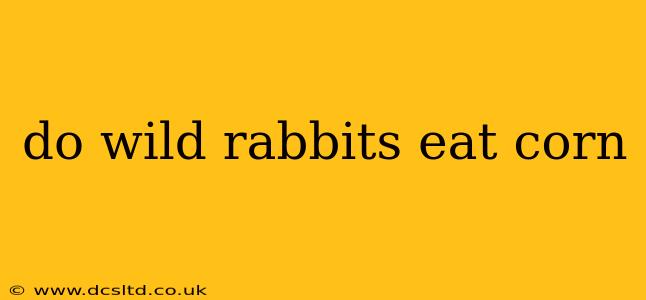Do Wild Rabbits Eat Corn? A Deep Dive into Rabbit Diets
Wild rabbits are fascinating creatures with surprisingly diverse diets. While they're known for their preference for grasses and other vegetation, the question of whether they eat corn is a common one. The answer, as with many things in the wild, is nuanced. Yes, wild rabbits will eat corn, but their consumption depends on several factors.
What Do Wild Rabbits Typically Eat?
Before we delve into corn specifically, let's establish a baseline understanding of a wild rabbit's typical diet. These lagomorphs are primarily herbivores, meaning their diet consists almost entirely of plants. Their preferred foods generally include:
- Grasses: Various types of grasses form the cornerstone of a wild rabbit's diet, providing essential nutrients and fiber.
- Forbs: These are broadleaf herbaceous plants, offering a variety of vitamins and minerals.
- Clover and Alfalfa: These legumes are rich in protein and are highly palatable to rabbits.
- Twigs and Bark: Rabbits will sometimes consume twigs and bark from certain trees and shrubs, particularly during winter months when other food sources are scarce.
- Fruits and Vegetables (occasionally): While not a staple, wild rabbits might occasionally supplement their diet with naturally occurring fruits and vegetables.
Will Wild Rabbits Eat Corn? The Answer is Yes, But...
Yes, wild rabbits will eat corn, both the stalks and the kernels. However, it's important to understand the context. They are more likely to eat corn when other preferred food sources are limited, particularly during periods of drought or in areas with less diverse vegetation. Corn offers carbohydrates, providing a quick energy boost.
What Parts of the Corn Plant Do Wild Rabbits Eat?
Rabbits can consume various parts of the corn plant:
- Corn Kernels: These are the most nutritious part, offering a good source of carbohydrates. However, they might be less readily available in the wild unless the corn is grown nearby.
- Corn Stalks and Leaves: When kernels are scarce, rabbits may feed on the stalks and leaves, though these are less nutritious.
Are There Any Risks Associated with Rabbits Eating Corn?
While corn itself isn't toxic to rabbits, consuming large amounts can lead to digestive issues. Corn is relatively low in fiber compared to grasses and forbs, which are crucial for a rabbit's digestive health. An excessive corn diet can cause digestive upsets, leading to problems like diarrhea or gas. It's also important to note that corn often contains pesticides, which can harm the rabbit if ingested.
What if I Want to Feed Wild Rabbits?
It's generally not recommended to intentionally feed wild rabbits. Providing supplemental food can disrupt their natural foraging behavior and lead to dependency. Furthermore, providing unsuitable food can negatively impact their health. Instead, focus on creating a habitat that supports diverse native vegetation, ensuring they have access to a natural and balanced diet.
How Does Corn Compare to Other Foods in a Wild Rabbit's Diet?
Corn is a less-preferred food source compared to grasses and forbs, which form the bulk of their natural diet. Corn is a supplemental food only, and it should never be a staple in a wild rabbit’s diet.
Can Corn Cause Health Problems for Wild Rabbits?
Excessive corn consumption can lead to digestive problems because of its relatively low fiber content. The presence of pesticides on commercially grown corn is also a significant risk.
In conclusion, while wild rabbits can and will eat corn if available, it's not a primary food source and should not be considered a staple in their diet. A balanced diet of native grasses, forbs, and other vegetation is crucial for their health and well-being. Always prioritize supporting a thriving natural habitat rather than providing supplemental food sources.
